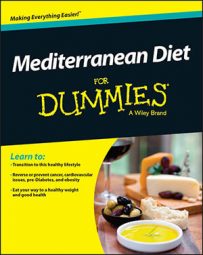People in the Mediterranean often eat less meat, so they depend on plant-based protein foods like beans and lentils. In addition to acting as a protein source, beans and lentils are also packed with fiber, B vitamins, and phytochemicals. They’re also economical and can create amazing flavor and texture in your meals.
Beans are available dried or canned. Canned beans are easy to use in any dish. Dried beans take longer to prepare, but they have better flavor and texture and less sodium than the canned variety. Lentils provide a unique, rich flavor and have the added benefit of quick preparation and cooking compared to dried beans.
If you aren’t used to eating beans and lentils, gradually add them to your diet and drink lots of water to cut down on the constipation and gas associated with these foods.
Preparing canned beans
Canned beans provide a whole lot of convenience and still pack great flavor. You can pretty much open them and serve, but keep these notes in mind:
If you’re adding canned beans to a recipe, rinse them in a colander unless the recipe instructs you not to. Doing so removes the saucy liquid and helps decrease about 40 percent of the sodium used as a preservative.
When incorporating canned beans into a hot dish that’s cooking on a fairly high heat, add them toward the end of cooking. Otherwise, they can become too soggy and fall apart.
Preparing dried beans
Using dried beans requires a little bit more upfront work than using canned does, but your reward is a richer taste than what canned beans offer. Follow these steps:
Sort through the beans, discarding any blemished or dirty ones.
Soak the beans.
Preparing dried beans for cooking involves soaking them in one of three ways:
Soak them overnight (the most common approach). Soak the beans in a large pot of water overnight (at least 8 hours). Afterward, simply discard the soaking liquid and cook with fresh water.
Soak them in boiling water. A quicker method is to bring the water to a boil, add the beans, remove the pan from the heat, and let the beans soak in the hot water for 3 to 4 hours. Discard the soaking liquid and then cook the beans in fresh water.
Soak them in a pressure cooker. For fast and furious soaking, use a pressure cooker. Add your beans and about 4 cups of water to the pressure cooker. Lock the lid on and turn the cooker to high pressure. After the cooker is heated to high, reduce the heat to maintain the pressure and cook for 2 minutes.
Release the pressure cooker by running cold water over the lid and then drain the beans; they’re now ready to use in your recipe.
Cook the beans, according to the recipe or package instructions.
Preparing lentils
Lentils require no soaking before cooking. Just sort through them, discarding any that are discolored or have dirt on them. Give them a good rinse in a colander, and cook them according to package directions or recipe directions.
Cooking times for dried legumes
To cook unsoaked lentils or soaked dried beans, cover about 1 pound of the legumes with 6 cups of fresh water (not the water used for soaking). Simmer the beans or lentils until they’re cooked and soft.
| Type of Legume | Cooking Time in a Saucepan | Cooking Time in a Pressure Cooker |
|---|---|---|
| Black beans | 2–3 hours | 15–20 minutes |
| Fava beans | 1 hour | 10–15 minutes |
| Chickpeas | 2–3 hours | 15–20 minutes |
| Kidney beans | 2–3 hours | 15–20 minutes |
| Lima beans | 45 minutes | Not recommended |
| Pinto beans | 2–3 hours | 15–20 minutes |
| Lentils | 30–45 minutes | Not recommended |
Most people prefer that their beans have a pretty soft texture. If you aren’t using a pressure cooker, you can try them at the early end of the cooking times to see if they’re soft enough for you; if they aren’t, continue cooking. Use your cooked beans within five days; if you can’t make that happen, you can freeze them for up to six months.

